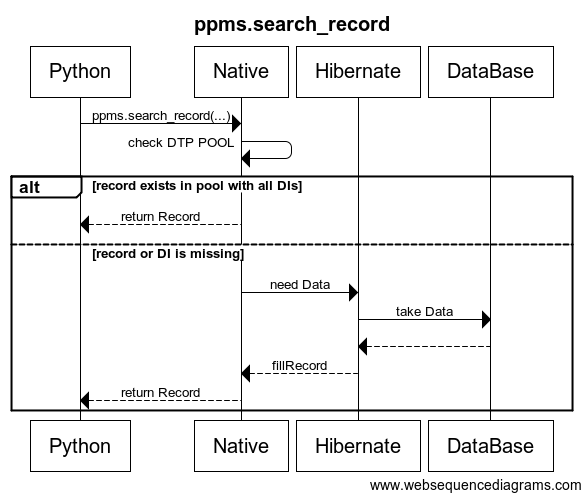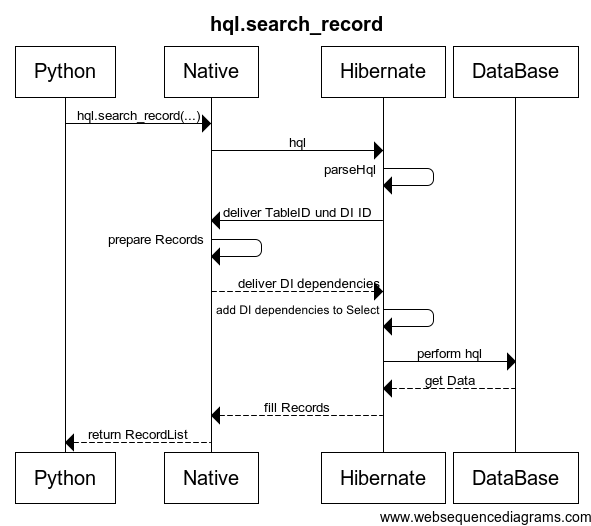The documentation from version 39.5.17 of PLANTA project can be found in the new PLANTA Online Help .
.
HQL
General
Information- HQL (Hibernate Query Language) is a query language, with the help of which you can directly address classes and objects without having to know their names in the database (e.g. "project.pr_id" instead of "DI001001 FROM DT461").
- Queries are translated in SQL statements and run internally.
- HQL names can be read from the Data Dictionary, entity names (for tables) or DI Python IDs (for columns).
- Via HQL, only SQL queries are transmitted directly to the database. Further PLANTA project functionalities, like e.g. dependent saving or deletion is therefore not possible.
- If, e.g., a project is deleted via HQL, the subordinate project structures are not deleted automatically either.
- At the moment, PLANTA project generally uses Hibernate version 4.3.4 with the contained functionalities including HQL: http://hibernate.org/orm/documentation/4.3
 .
.
HQL Module
Information- In order to be able to use HQL, the hql module must be imported first.
from hql import hql
import hql
Methods
Information- There are three functions available for HQL.
search_record
Details- This method returns a list of DTP records.
hql.search_record(String hql)
before = hql.search_record("from Project project where project.pr_id='{}'".format(id))query
Details- This method returns a list of data (in list form) according to
db_select().
hql.query(String hql)
before = hql.query("select project.pr_id, project.project_note from Project project where project.pr_id='{}'".format(id))modify
Details- With hql.modify you can carry out update or delete statements. The number of changes made to the DB is returned, according to
db_modify().
hql.modify(String hql)
hqlString="update Project project set project.project_name='{}' where project.pr_id='{}'".format(project2.rec.project_name.get_value(), project1.pr_id)
hql.modify(hqlString)hqlDelete = "delete Module m where m.id_ = '{}'".format(module.id.get_value())
result = hql.modify(hqlDelete)- In HQL, properties are only identified via Python IDs.
- Names like "id","class", "enum", "const" are reserved for Hibernate and Java. All Python IDs that use this name can be accessed in HQL with Python ID and underscore, z.B. ("id_").
- Instead of table names, the names of entities are used.
HQL Documentation
Information- In HQL, the entity name is used instead of the table name, and instead of the column name, the property name is used.
- You can look up the entity name in the Data Dictionary (Entity name field). If it is not listed, the entity name is DTxxx.
- In PLANTA project, entities are currently not linked via associations. I.e., joints between them cannot be used.
- The property name equates to that of the DI Python ID. If it is not listed, the property name is DTxxx.
hql.search_record(" from Project p where p.pr_id = '4711' " ) - In HQL, UUIDs are to be handed over as strings.
import hql
from ppms import ppms
project_record = ppms.search_record(461, ['4711'], ['uuid'])
uuid = project_record.uuid.get_value()
query = "SELECT project.project_name from Project project where project.id = '{uuid}'"
result = hql.query(query.format(uuid=uuid))
ppms.ui_message_box(result) # [['Electronic Overhead Conveyor']]- For further information on that topic, please see the official HQL documentation
 .
.
Advantages of hql.search_record and ppms.search_record
ppms.search_record()

- Only accesses the database in case the record does not exist.
hql.search_record()

- Search on more than one record.
- Search is not restricted to the primary key, but can do everything that is also possible in an HQL where clause.
| I | Attachment | History | Size | Date | Comment |
|---|---|---|---|---|---|
| |
hqlsearch.png | r1 | 29.7 K | 2014-09-19 - 15:59 | hql |
| |
searchRecord.png | r1 | 28.7 K | 2014-09-19 - 15:58 | searchrecod |


